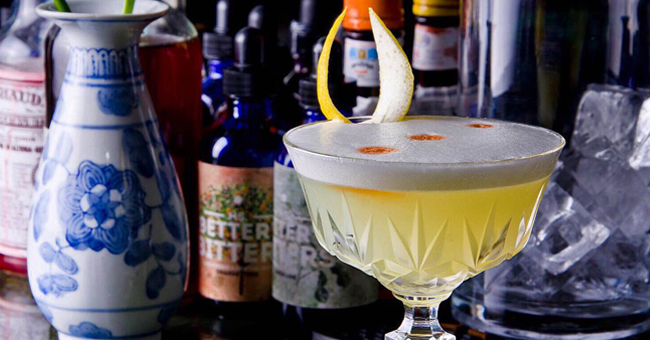What do a Ramos gin fizz, bourbon milk punch and Irish coffee all have in common? Aside from being totally delicious, these classic imbibes rely on ingredients like egg white and heavy cream for their texture (as in the meringue-like Ramos), richness, or flavor. But that doesn’t mean that vegans can never know the joys of a well-shaken fizz or a piping-hot, whipped cream-topped Irish coffee. With vegan diets becoming more and more commonplace, creative bartenders are discovering clever hacks and substitutions for recreating these classics.
And it’s not just the usual suspects, like egg and cream, that vegans have to avoid. “In the modern era it’s become more difficult with the increase in techniques such as fat washing and rotovaping where meat products are increasingly being used by bartenders,” says Tim Etherington-Judge, vegan and Bulleit brand rep. But animal-friendly imbibers need not despair. From bean brine to the ever-versatile coconut, read below for the unlikely ingredients making their way into vegan-friendly drinks:
1. Pineapple gum syrup
Jacquelyn Goldstein, a bartender at San Francisco’s ABV and a vegan herself, points to this cocktail ingredient as a surprisingly convincing egg white sub. “When shaken hard with a little bit of aeration, it will create a nice thick froth similar to egg white,” she says. She adds that a whiskey sour-like drink at ABV (The Jackal) originally included egg white, but over time, they realized it wasn’t necessary. “The pineapple created a perfect froth,” she says. Note: if you don’t have gum syrup on hand, even well-shaken pineapple juice will do.
2. Beer
Weird, we know—but the sudsiness of beer can actually mimic the froth of egg white in a cocktail (albeit with a slightly more detectable flavor). “Add the beer as a float to the cocktail after it has been shaken and strained and you get a lovely froth,” says Goldstein. Just be sure to reach for a lighter style.
3. Coconut cream
It makes oil, butter, cream and water—and it’s probably the one food that both vegans and paleo types can agree on. Is there anything the coconut can’t do? Not according to Goldstein, who uses it in everything from vegan White Russians to tiki cocktails. “I like to take a coconut and chop it in half, then scoop all the meat out of the coconut and macerate that along with the coconut water in a VitaMix or processor,” says Goldstein. “It makes a lovely coconut cream.” The resulting product can even be used in an Irish coffee. ”I like to make my Irish Coffees with Irish whiskey, coffee, St George’s NOLA Coffee Liqueur, coconut cream and a little bit of simple syrup,” she says. “I like to top it off with vegan whipped cream made with canned coconut cream for thicker constancy, and powdered sugar with a pinch of vanilla extract. Then put a little nutmeg on top and it’s amazing!” Dare we say it sounds better than the real thing?
4. Chickpea brine
The virtues of the viscous brine in canned chickpeas, otherwise known as aquafaba, has been shouted from the rooftops by seemingly every vegan food blogger on the Internet. The stuff has miraculously egg-like properties as an emulsifier and foaming agent, and it’s not uncommon to see it pop up in everything from vegan bread to vegan brownies. Those qualities make it suitable for cocktails, too, according to Erin Rea, manager at Belga in San Francisco. “It provides the same frothing properties [as egg whites], and the flavor is mild enough that it doesn’t interfere with the taste of the cocktail,” she says. Three Muses’ Heather Cafarella agrees: “It makes a killer whip — in my opinion, better than coconut cream, simply based on texture,” she sasys. “It is more complicated, though… it must be whipped in a standing mixer for at least 10 minutes with vanilla, sugar, & cream of tartar. However, it really holds up!” She’s even come close to recreating a vegan-friendly Ramos gin fizz with the stuff, which just might be the ultimate test for any faux-egg substitute.
5. Coconut oil & nut butters for fat-washing
Ever since the Benton’s Old-Fashioned first reared its head at PDT, bartenders around the world have been tinkering with the effects of fat-washing. While most associate the technique with imbuing the fatty, smoky flavors of bacon, it’s actually not just a meat-eater’s domain. Tarquin Melnyk, who designed the bar program at Vancouver’s Bambudda, uses a peanut butter wash on the rum in his blue-tinged tribute to the PDT Shark, while Matt Grippo (Blackbird) washes Scotch in coconut oil for “a subtle flavor infusion and a rounder mouthfeel” in his Don’t Sweat the Technique drink. “I get the [unrefined] coconut oil to a liquid state and do about 3 oz per liter. Let it sit at room temp for at least 24 hours. I like to agitate the jar so that the oil doesn’t fully solidify on top of the container. After 24 hours I put it in the freezer overnight. Once oil is frozen I strain solids and then double strain through a coffee filter.”
6. VersaWhip
Omar YeeFoon, of The 86 Company, borrows a few mad-scientist ingredients from molecular gastronomy: namely, VersaWhip, a soy protein that’s been enzymatically treated to give a light, airy foam effect. (Vegan bakers know it for its handiness in egg-free macarons and meringues.) “VersaWhip contains no animal products and is a great substitution for foams,” says YeeFoon. “It is not a direct substitute for eggs, though, as it doesn’t create that emulsified, creamy texture in a cocktail.”
7. Agar Agar
This seaweed-based component is pulled straight from the modernist cuisine playbook, thanks to its usefulness as a thickening agent and in making gels and foams. “I get the most usage out of Agar Agar,” says YeeFoon. “It is a gelatin substitute that is great for clarifying juices and cloudy liquids, as well as creating gels and solid cocktail foams without the use of animal proteins.”
8. Egg substitutes
Bambudda recently caught our attention with their use of a mysterious faux-egg product in their vegan pisco sour. Turns out, the stuff in question is a brand-new product: Ms. Better Bitters’ Vegan Botanical Foamer. “It is a secret blend of three organic botanicals macerated into a neutral grain spirit,” says MeInyk. “The dosage is set so that just 6 drops effectively replaces the need for an egg white in terms of texture and appearance, minus the smell/allergy/pathogen risks associated with egg whites. It’s shelf stable, and even the most basic shake activates it in a drink.” Unlike the aforementioned chickpea juice, MeInyk says the product has little to no effect on the taste of the drink. “What’s interesting is that, while egg whites tend to slightly mute flavors, the Foamer provides the same effect but the drink remains vibrantly flavorful,” he says. The foamer isn’t available to the public yet, but MeInyk says it will begin distribution throughout North America soon.
If you can’t wait, Bulleit’s Tim Judge has a few recommendations for decent egg substitutes. “A little company called Beyond Eggs has had a powdered egg substitute available through Whole Foods for a while now, and this month Amazon will start selling Follow Your Heart: VeganEgg,” he says. “There are numerous advantages to using these products in the bar, besides allowing everyone, no matter of dietary requirements, to enjoy your drinks. They are far more stable and consistent than real eggs and will make batching drinks containing eggs far, far easier. With a shelf life of 6 months, storage and spoilage are no longer a concern, plus there’s zero chance of breaking them.” Also, that whole no-salmonella thing—always a plus.





